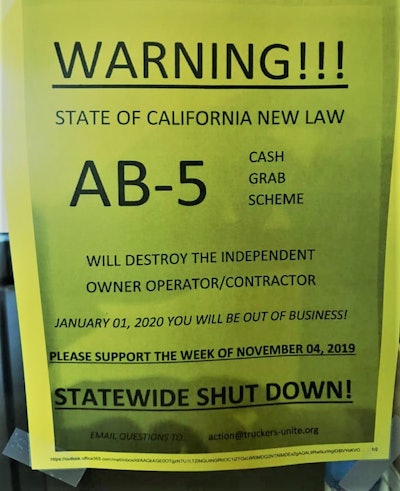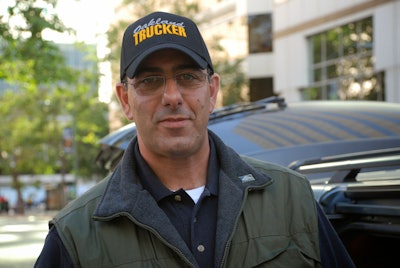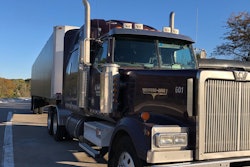
AB Trucking small fleet owner Bill Aboudi, who runs eight trucks in and out of the Port of Oakland and also occasionally contracts with owner-operators who serve the Port of Oakland (often working under non-exclusive arrangements with multiple carriers as independent contractors, he says), shared the above image to his LinkedIn profile recently. It’s one of several flyers he’s seen that he believes are coming from various owner-operators around the Port of Oakland and elsewhere in the state frustrated with what they’re being told in consultation with companies they contract with for freight — in his operation, that’s containers by and large.
“Every time we’ve had a protest at the port,” he says, “it’s a grassroots efforts where the owner-operators get pissed off.” He has no reason to suspect anything otherwise is going on here. The flyer above, printed from someone’s Outlook email account by the looks of it, references an email whose domain (Truckers-Unite.org) doesn’t go to a functioning website. My messages to the account early in the week went somewhere (they didn’t bounce back as undeliverable), but they were not answered. Another of the flyers claims to be a message from “The Truckers Group.” Sourcing on both, though, remains vague.

The antipathy expressed toward California bill AB 5 — which codified a quite difficult standard for the independent contractor relationships owner-ops have held with partner carriers to date — however, is familar to Bill Aboudi.
“I’m speaking against it even though I have employee drivers,” he says, in his eight trucks. The port trucking business in Oakland and elsewhere is “really unpredictable. On some days, we’re running nice and smooth – all of a sudden a ship is late, a ship is early, and it all has to happen now. That’s where owner-operators come in” and opportunity is maximized for them. Aboudi keeps what he calls a “cheat sheet with people who qualify with you.” Now those relationships with owner-operators (all of whom also work with other carriers as well, some with their authority and some without), given Aboudi owns trucks and is principally in the business of trucking, are open to legal challenge under AB 5.
For him, what that means is “I have to take less work” from the ship lines. He posits a 10-load job up for bid. “With only 8 trucks, I can’t bid on that job” without the flex capacity port owner-ops offer.
AB 5, ultimately, “will hurt everybody” similarly over time, he believes.
 AB Trucking owner Bill Aboudi
AB Trucking owner Bill AboudiWhat owner-operators are hearing from larger companies, he says, is a mix of solutions, from those who aren’t doing anything immediately to others exploring a two-check system or requiring owner-operators to get authority and interface with the company through a piece of technology like an app for loads, as a broker. As I’ve covered before, there are added costs involved in both models; Aboudi notes in particular:
- Under a two-check system, the employer assumes new tax liabilities for the former independent contractor, while the owner-operator (essentially operating a rental business) now loses some of the deductions associated with operating the truck. One large company who gave a presentation Aboudi recently sat through estimated the additional costs in such an arrangement could equate to between 10% and 40% of an owner-operator’s current income, depending on the situation, factoring in tax implications but also health and other benefits the company offers employees.
- Getting motor carrier authority comes with a big increase in insurance costs, particularly when it comes to interstate new entrants but also in-state haulers.
As for the protest flyers going around the Oakland port, his own drivers and others have been bringing them to him, he says. Another singled out November 4-6 as specific dates for protest. Another flyer noted November 5 for a gathering at Middle Harbor Park in Oakland, yet did not specify a time.
“Talking to owner-operators throughout the port,” says Aboudi, “I ask, ‘what’s your company saying?’ Some are like, ‘Well, they said for me to get my own authority.’ Another said they’re going to an employee model and they’re buying trucks. Another said, ‘We don’t know, let’s see what happens on Jan. 1.’ What a great way to have certainty for a guy to get a paycheck.”
You probably sense the sarcasm in his last sentence there.
Ultimately, looking at effects long-term, Aboudi worries the California law is just pulling up the ladder he and many others climbed from his start in the business in the late 1980s. “Almost all the trucking companies at the port that I know started as independent contractors and moved themselves up.” He pointed also to a friend who, in late 1980s, started driving as “a Teamster company driver, then switched to owner-operator [for greater income opportunity] while taking care of his daughter as a single father. Now, he owns a warehouse and a trucking company.
“Is there misclassification going on in some cases? I guarantee there is, but let’s go after that. Why disrupt every industry” on account of a few bad actors?
Potential remains for court action or, perhaps next year, a referendum on the ballot over the new law, but time is short. Assuming nothing changes, it goes into effect Jan. 1, as intimated above.
More from recent coverage of potential California AB 5 ramifications:










